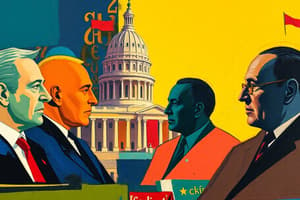Podcast
Questions and Answers
Elite interests can be categorized into four domains: self-interest, pragmatism, altruism, and individualism.
Elite interests can be categorized into four domains: self-interest, pragmatism, altruism, and individualism.
False (B)
Researchers studying elites often face challenges with maintaining focus during interviews.
Researchers studying elites often face challenges with maintaining focus during interviews.
True (A)
Elite theory is no longer a subject of debate among scholars.
Elite theory is no longer a subject of debate among scholars.
False (B)
The populist elite paradox explores the relationship between elites and environmental critiques.
The populist elite paradox explores the relationship between elites and environmental critiques.
Elite theory provides a way to understand power dynamics in societies.
Elite theory provides a way to understand power dynamics in societies.
Studying the composition, interests, and activities of elites has no relevance in understanding societal changes.
Studying the composition, interests, and activities of elites has no relevance in understanding societal changes.
Elites in elite theory are individuals who lack power and influence.
Elites in elite theory are individuals who lack power and influence.
Elite theory only focuses on the role of political leaders in society.
Elite theory only focuses on the role of political leaders in society.
Elites pursue interests that are completely unrelated to their backgrounds or careers.
Elites pursue interests that are completely unrelated to their backgrounds or careers.
The debate between monism and pluralism in elite theory is about the extent of diversity among elites.
The debate between monism and pluralism in elite theory is about the extent of diversity among elites.
According to research in Uganda, policy elites cannot be divided into subgroups based on sources of power.
According to research in Uganda, policy elites cannot be divided into subgroups based on sources of power.
Elite theory has only been applied in political science but not in other disciplines.
Elite theory has only been applied in political science but not in other disciplines.
Study Notes
Unpacking Elite Theory
Elite theory is a framework that seeks to understand the roles, interests, and power dynamics of influential individuals and groups within society. It has been applied across various disciplines, including political science, economics, and sociology, to examine how decision-making and policy formation unfold at the highest levels.
Key Components of Elite Theory
- Elites: Elites are groups of individuals who possess significant amounts of power and influence due to their positions, expertise, or access to resources. They can include political leaders, business executives, academics, or other professionals.
- Interests: Elites often pursue interests that align with their backgrounds, careers, or ideologies. These interests may include economic gains, political advantage, or the fulfillment of moral objectives.
- Power: Elites wield power through their positions, knowledge, and connections, which enable them to shape policy and influence decision-making.
- Integration and Pluralism: The extent to which elites form a cohesive group or represent diverse interests is a central debate in elite theory. Traditionally, this debate is referred to as the "monism" versus "pluralism" divide.
Elite Theory in Action
Research in Uganda, for example, demonstrated that policy elites can be divided into subgroups based on their sources of power, which included expertise, access to information, and control over resources. This research also highlighted that elite interests could be categorized into three domains: self-interest, pragmatism, and altruism.
Challenges and Strategies in Studying Elites
Scholars face various challenges when studying elites, including issues with access, maintaining focus during interviews, and ensuring the validity and generalizability of the results. To address these challenges, researchers often employ strategies such as elite interviews, participant observation, and the use of elite experiments.
Theoretical Debates and Applications
Elite theory continues to be a subject of debate and discussion among scholars. For instance, the populist elite paradox examines the relationships between elites and populist critiques, highlighting the role of elite theory in understanding modern political discourse.
In conclusion, elite theory provides a lens through which we can understand the power dynamics and decision-making processes that shape our societies. By studying the composition, interests, and activities of elites, we can better comprehend the forces that drive change and maintain the status quo in various domains.
Studying That Suits You
Use AI to generate personalized quizzes and flashcards to suit your learning preferences.
Description
Explore the key components of elite theory, including the roles of elites, their interests, and the power dynamics at play. Discover how elite theory is applied in various disciplines and its implications on policy formation and decision-making processes.




